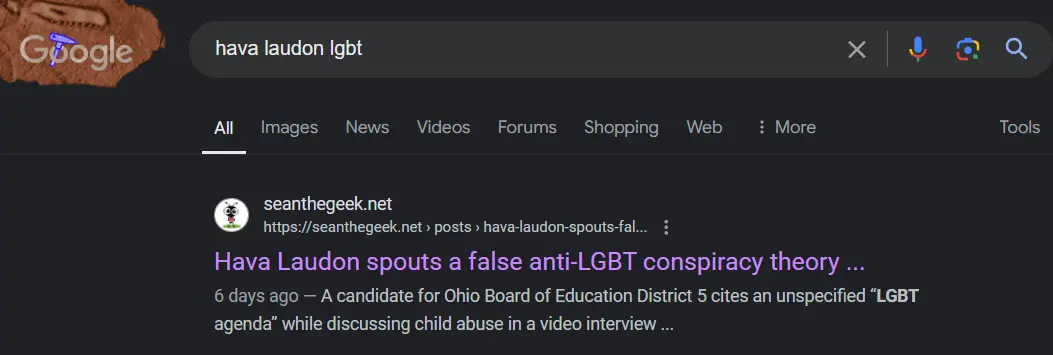A quick Search Engine Optimization (SEO) Guide
How to rank high in search results without a Big Tech conspiracy
Almost all of the posts on this blog are related to information security and other technical topics. In general, I only write posts about politics to cover topics that are not being covered elsewhere. Recently, I researched a local political candidate before filling out my ballot. While looking at her campaign website I saw talking points that alluded to anti-LGBT topics, but nothing specific. I did a Google search for candidate's name LGBT but I didn’t find anything definitive. After finding the answers I was looking for in a video interview on her campaign website, I published a blog post about about my findings. As shown in the image above, that post now ranks first in a Google search for candidate's name LGBT and third on Microsoft Bing for the same search. Before anyone accuses me, Google, or Microsoft of some sort of Big Tech conspiracy, I’d like to explain why that post is ranked so highly in search engines, and how to leverage Search Engine Optimization (SEO) on your own website or blog posts.
Provide detailed information about a topic people want to know about
If you are searching for a particular topic, chances are others are too. Use the same vocabulary as your target audience, and include as much detail as possible. To write my blog post, I watched that entire video, manually transcribed the parts of the video that mentioned policy word-for-word, and included that in the blog post. I also included my own commentary, but I made sure to mark the transcriptions as blockquote elements to make the separation between quotes and commentary clear for both readers and search engines.
Use a descriptive title that contains important search terms
Use a descriptive title, but try to keep the important search terms near the beginning of the title, rather than the end. That way they won’t get cut off when search results are displayed to the user. Blog and content management systems will include the title in the post URL and top-level heading.
Include search terms as part of the post content
Include search terms as a part of the post content, but only do it where it fits naturally. Don’t repeat terms over and over again just for the word count.
Provide alt-text for all images
Alt-text is used to describe images for visually impaired people for visually impaired people who use screen readers. It is also used by search engines to understand what the images are. Search engines reward sites that use alt-text on images related to post content with higher rankings.
Provide a featured image and post meta description
Blogging and content management platforms allow you to set a featured image (with alt-text) and description that will that will display in social media previews of your post. This another place to naturally include search terms or words related to them.
Use headings to break up content where appropriate
Headings help your readers find the content they are looking for, especially in longer posts like this one. Headings also provide the opportunity to add related keywords.
Add internal and external links
When you are mentioning a related topic, add a link to another site or page on your own site that provides more details. However, never make the keyword your are targeting part of the link text. For example, I’m not including the word SEO in the link below:
Yoast provides SEO plugins for WordPress and Shopify that give SEO advice as you create content.
Get external sites to link to your content
As your content gets popular more people will link to it. Consider sharing your content with popular communities. For example, I shared my post about the Ohio Board of Education candidate to the /r/Ohio subreddit. However, don’t go overboard and spam various places with links.
Site rankings get better with age
It might take a while for your site to be included in search results, especially for a new website. I have been writing this blog since 2016, filling it with lots of useful guides that others have linked to.
Different search engines rank things differently
My post ranked first on Google and third on Microsoft Bing for the same search query.
See also
- The SEO entry on Wikipedia
- Google Search Central
